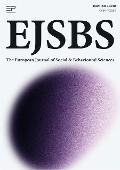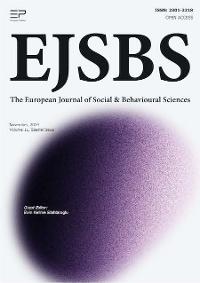Abstract
SEN student have right for appropriate education, based on their interests, needs and abilities together with their peers. Does teacher in regular school possesses required general and specific competency and knowledge for SEN student teaching is the main question in the field of compulsory education. To work in inclusive classroom, teacher has to know specific characteristics about disabilities, strategy of teaching and develop personal competencies to create stimulating environment for learning. This study want to discuss teacher personal perception of their own competency for teaching SEN student in early and compulsory regular education. Sample is conducted from 100 early and compulsory teachers, employed in regular schools. For this study questionnaire was created. In first part there are general questions about age, level of education, experience working in school. Second part includes 47 items divided in 7 areas, experience with SEN students, attitudes about disabilities, knowledge, acceptance, professional support in school. Results shows that about 70% of examined teacher have none or very little knowledge about teaching SEN students, and their attitudes are mostly negative but younger teachers experience higher competencies. Further, some teachers that have positive attitudes about inclusive education would not accept SEN student if could make choice. Competencies of examined teacher in regular school are not equally developed. Reason for those findings, in some aspect, could be found in teacher training college program which has been changed in last decades. According to results, and teachers personal perception of their own competency, conclusion that teachers do not have necessary skills and competency can be made.
Keywords: SEN student, teacher competencies, inclusion
Introduction
In front of every teacher there are many demands, and expectations set from professional and social environment in which should rethink about self and vocation, define long-term goals of pedagogical acting, knows the way of student learning, thinking, feeling and acting. Also, teachers develop skills that enhance personal satisfaction and effectiveness, but also knowledge and skills that encourage student self esteem. Complexity of teacher work demands competences for every day dealing with student learning, emotional and behavioral characteristics. Deakin Crick (2008) described competence as a “complex combination of different knowledge, skills, understanding, values, attitudes and desire which lead to effective, embodied human action in the world, in a particular domain”. It is necessary to understand the pedagogical competencies of teacher as continuing process which is permanently submitted to valuation through the interaction with co-workers, student, parents and others (Ljubetić & Kostović Vranješ, 2008).
Inclusive education assumed identification and elimination of existing and possible sources of exclusion or separation which represent limitation of opportunities for all students and in the same time examines features of school, teachers, students, teaching and learning (Slee, 2003). In context of inclusive process, schools and classrooms meet various students and challenges to deal with. Students with disabilities, in this paper special education needs (SEN) student, are included in regular schools with their peers. Some of schools have assistants to help in classroom as only support to student. Other schools have professional support from special education needs teachers, psychologists, social workers, work therapists, etc. The most of schools don’t have any support, so the teachers manage with range of different demands in classrooms. Hastings and Oakford (2003) argued that students with emotional and behavioural problems have negatively influence on teachers and peers than students with intellectual disabilities.
Bradshaw and Mundia (2006) quote some variables that have the most influence on process of inclusion. Related to teacher they highlights efficiency, work experience, beliefs about students and their education, educational environment in which they put accent on availability of support. As shown in earlier studies, teacher quality is essential factor for in student learning (Blanton et all, 2003). Considering the teacher as the most important factor of inclusive education process, he has obligation to create appropriate and stimulating environment for learning. In dealing with professional demands on creating opportunities for easily SEN students learning, teacher has to possess specific professional and personal competences. Personal competences could be observed through the attitudes and motivation for teaching SEN students in regular schools settings and professional competencies through the SEN student characteristic knowing, recognizing abilities for and ways of learning.
Problem Statement
SEN students have right for appropriate education, based on their interests, needs and abilities together with peer without disabilities. Inclusive class teacher has to be educated in specific areas related to the SEN student way of learning. Process of formal education of future teacher students is directed to develop those competencies that ensure achieving and valuable results. Current educational and school practice requires teacher who is ready for teaching in such demanding conditions created by specific characteristics of student with disabilities. It is reasonable to believe that competent teacher can and will enable sense of success and satisfaction to his or her students. Ashby (2010) comment that the process of inclusion was more social than academic oriented with accepting and developing positive attitudes as main goals. However, government through legislative commits schools, and directly teachers to create individual curriculums for each SEN student.
Research Questions
Does teacher in regular schools possesses required general and specific competences and knowledge for SEN student teaching?
Purpose of the Study
To work in inclusive classroom, with SEN students included, teacher has to know specific characteristics about disabilities, strategy and develop competences to create stimulating environment for learning and interaction. This study aims to discuss personal perception of teacher competence for teaching SEN student in early and compulsory regular schools.
Based on general purpose of this study, the next goals were appointed:
- Exam the experience in SEN student teaching in regular classrooms
- Distinguish personal perception of competences needed for SEN student teaching between teachers
- Range of competences for SEN student teaching acquired through the formal college education
Research Methods
For this study questionnaire was created. In first part there are general questions about age, level of education, experience working in school. Second part includes 47 items divided in 7 areas, experience with SEN students, tendency to learn, attitudes, knowledge and skills, acceptance, professional support in school. Sample was finally conducted from 86 (100 questionnaires were send) teachers early and compulsory teachers, employed in regular schools were SEN students attend. Some questionnaires were not fully completed (9), five (5) not returned. Study is a part of research on inclusive education quality factors in County Varazdin, Croatia, and some results will be presented.
Findings
Results show that all participants have had experience with teaching student with disabilities in some period of work or still have. Results on variables that presents teacher perception of competence (5-strongly agree, 4- agree, 3-not sure, 2-disagree, 1-strongly disagree) are shown in table 2. Grey cells content results from younger group of participant. Distribution of answers on every category was found and some categories are more represented depending on variable. Variables concerning hearing and vision impairment were eliminated because there were no students with this kind of disabilities. Variables on motor disabilities, autism, ADHD and intellectual disabilities are presented.
Categories four and five (agree and strongly agree) and the categories one and two (disagree and strongly disagree) were most common selected. That means if we add them together and summarize, about 70% of examined teacher have none or very little knowledge about teaching SEN student. There are minimal differences between two examined groups of teachers. Higher levels of competences were found in younger teachers. For a better understanding and interpretation of this data, it is necessary to do complete statistic analysis. Further, participants were asked about dealing with SEN student discipline and behavior problem. According to this variable, younger teacher have more problems in dealing with behavior problem (69, 22%) then older teachers (53,18%).
38,2% of sample would accept student with motor disabilities; 23,4% would accept student ADHD; 20,1% would choose student with intellectual disabilities; 10,5% would choose student with autism and 7,7% could not decide. Though teachers have more or less positive attitudes about inclusive education, the great number of them would not accept SEN student if could make choice.
Conclusions
Competences of examined teacher in regular school are not equally developed. Reason for that could be, in some aspect, found in faculty for teacher training program which has been changed in last decades. Also, we did not examine the correlation between urban and rural teachers and competence perception, number of students in classrooms, professional support in schools, cooperation with other institution that could influence on results interpretation. Inclusive education process will result with different experiences, literature and researches. Inclusive education could be a benefit for all participant, teachers, students and parents. When we talk about inclusive education, there is an important question about teacher competences as basic carrier of educational process.
References
Ashby, C. (2010). The trouble with normal: the struggle for meaningful access for middle school students with developmental disability labels. Disability and Society, 25, 3, 345 – 358.
Blanton, L., Sindelar, P.T., Correa, V., Hardman, M., McDonnell, J., & Kuhel, K. (2003). Conceptions of beginning teacher quality: Models of conducting research. (COPSSE Document Number RS-6). Gainesville, FL: University of Florida, Center on Personnel Studies in Special Education.
Bradshaw, L., & Mundia, L. (2006). Attitudes to and concerns about inclusive education: bruneian inservice and preservice teachers. International journal of special education, 21,1, 35-41.
Deakin Crick, R. (2008). Pedagogy for citizenship. In F. Oser & W. Veugelers (Eds.), Getting involved: Global citizenship development and sources of moral values (31-55). Rotterdam: Sense Publishers.
Hastings, R., & Oakford, S. (2003). Student teachers’ attitudes towards the inclusion of students with special needs. Educational Psychology, 23, 87-94.
Ljubetić, M., & Kostović Vranješ, V. (2008). Pedagogical (in) competence of teachers. Educational science, 10, 1, 209-230.
Slee, R. (2003). Valuing diversity and inclusiveness: The DDG speaks out on inclusive education. Education Views, 11.
Copyright information

This work is licensed under a Creative Commons Attribution-NonCommercial-NoDerivatives 4.0 International License.


